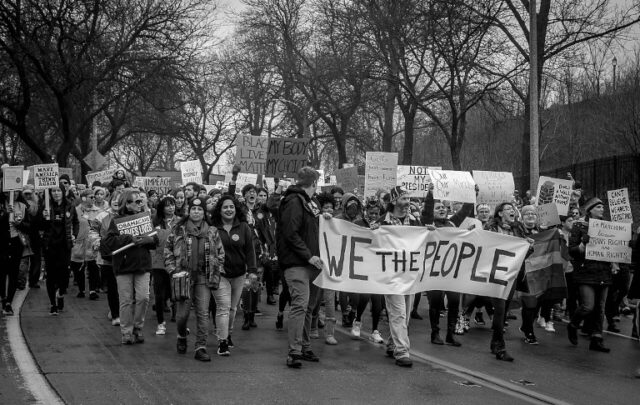
The Fear That Drives Climate Change Denial
Tom Jacobs, Pacific Standard
New research finds conservatives perceive environmentalists as a threat to society…
Newly published research suggests that, on a deeper level, this denial is driven by deep-seated fear.
Among American conservatives, "Environmentalists have been characterized as watermelons: Green on the outside, but red on the inside," write Brock University psychologists Mark Hoffarth and Gordon Hodson. "At its core, this ‘watermelon’ characterization posits that environmentalists threaten the Western way of life."…
Two-Thirds of Americans Want U.S. to Join Climate Change Pact
Giovanni Russonello, New York Times
A solid majority of Americans say the United States should join an international treaty to limit the impact of global warming, but on this and other climate-related questions, opinion divides sharply along partisan lines, according to the latest New York Times/CBS News poll.
Two-thirds of Americans support the United States joining a binding international agreement to curb growth of greenhouse gas emissions, but a slim majority of Republicans remain opposed, the poll found. Sixty-three percent of Americans — including a bare majority of Republicans — said they would support domestic policy limiting carbon emissions from power plants…
The Science Of Why Scarcity Makes Us More Creative
Charlie Sorrel, Fast Coexist
The rise of mass consumption has driven worldwide economic growth for decades. But does it help our creative growth? According to a new study, the answer is no. When we stop buying new things, we look at what we already have in new ways and come up with new uses for products we own. In other words, scarcity drives creativity. When we aren’t surrounded with ready-made solutions to problems, we have no trouble coming up with our own…
COP21: What’s going on with fossil fuels around the world?
Zachary Davies Boren, Greenpeace Energydesk
…Here’s a roundup of what’s happening on the fossil fuel front heading into the second week of COP:…
An ‘Airpocalypse’ Is Forcing Beijing Residents Indoors
Reuters and VICE News
The big Paris climate summit opened Monday with the capitals of two of the world’s leading carbon emitters shrouded in choking smog.
In Beijing, the capital of the world’s most populous country and its No. 1 source of planet-warming carbon compounds, Greenpeace China called the thick haze the worst pollution of the year.
Beijing’s small-particulate matter readings topped 500 micrograms per cubic meter on Monday, a reading scores of times beyond safety standards in the United States and Europe. And in India, No. 2 in population and No. 3 in emissions, US Embassy monitors in New Delhi recorded pollution levels over 400 — a figure well into hazardous territory…
Clean energy tax credits mostly go to the affluent. Is there a better way?
David Roberts, Vox
One of the main ways US policy encourages the uptake of new clean energy and energy efficiency technologies is through the use of tax credits. There are tax credits for qualified windows, boilers, air conditioners, insulation, and more…
Some new research brings troubling news about those tax credits. To put it bluntly: They are highly inequitable. Most of the money goes to relatively affluent consumers.
Let’s look quickly at the research, touch on how the credits might be improved, and then discuss the political implications…
Earth has lost a third of arable land in past 40 years, scientists say
Oliver Milman, The Guardian
The world has lost a third of its arable land due to erosion or pollution in the past 40 years, with potentially disastrous consequences as global demand for food soars, scientists have warned.
New research has calculated that nearly 33% of the world’s adequate or high-quality food-producing land has been lost at a rate that far outstrips the pace of natural processes to replace diminished soil.
The University of Sheffield’s Grantham Centre for Sustainable Futures, which undertook the study by analysing various pieces of research published over the past decade, said the loss was “catastrophic” and the trend close to being irretrievable without major changes to agricultural practices…
Sowing the seeds of an organic revolution
DeutscheWelle
In the 1990s, Colombia’s capital Bogotá was a dangerous place. Daily kidnappings and guerrilla violence were commonplace, pushing marketing manager Alexander von Loebell to seek solace outside of the city. Von Loebell, 51, found that solace every weekend working at Gabeno, a small organic farm an hour west of the city. There he got his hands dirty in piles of cow manure compost and grew seasonal crops using natural fertilizers. He felt newly connected to the earth, and his own health. Looking for his next meaningful challenge in 2002, the Colombian-born German founded BioPlaza, Colombia’s first and only chain of organic stores and restaurants. BioPlaza stocks products such as traditional shade-grown coffee, and hibiscus tea and honey hailing from MUVEA, a women’s farming organization formed last year…
Hiding the Homeless: What Happens When Cities Make Homelessness a Crime
Films for Action via Vice News
A growing number of American cities are ticketing or arresting homeless people for essentially being homeless. The new laws ban behavior commonly associated with homelessness like reclining in public, sharing food or sitting on a sidewalk.
Supporters argue these measures are necessary to push homeless people into the shelter system and maintain public safety. Critics say the laws violate the rights of homeless people and ignore the more complicated drivers of homelessness like mental illness…
Europe split over refugee deal as Germany leads breakaway coalition
Ian Traynor, The Guardian
Angela Merkel holds surprise mini-summit in Brussels with nine EU countries willing to take large numbers after meeting resistance to mandatory sharing scheme…
Statoil follows Shell out of Alaska
Margaret Badore, Treehugger
This week, the Norwegian oil company Statoil announced that it is abandoning all plans to drill in the Alaskan Arctic. The announcement follows a similar announcement from Shell, who said they would end Alaskan off-shore drilling operations in September. Shell said it was abandoning efforts after exploratory drilling didn’t find enough oil to merit continuing…
























